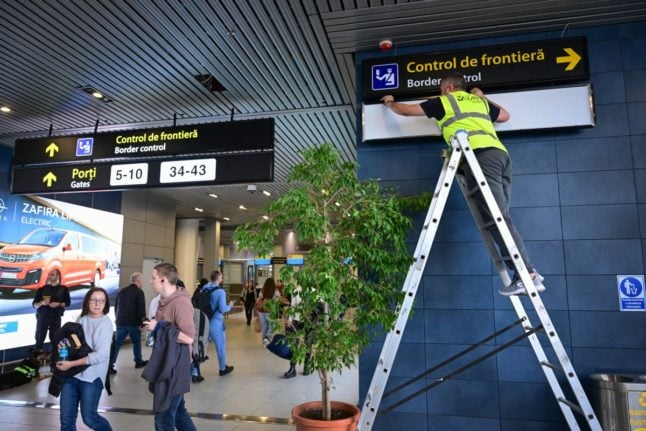When a (presumably by now rather contrite) David Cameron pitched his idea for the dystopian reality series that became Brexit, even he probably didn't imagine that it would be commissioned for such a long run, or that it would conclude in such an extraordinary and improbable cliffhanger.
Not since the epic Britpop chart battle of 1995 has the nation been so polarized by a feud between a slightly scruffy, city-dwelling pacifist and a messy-haired loudmouth with a turbulent relationship with his brother and a reputation for givin' it all that.
But as we head towards what Mr Johnson would have us believe is the season finale on December 12th, the mood in the UK seems to be less 'hazy festival days with a six-pack of lager', and more 'stockpile a six-pack of beans, we might need them come January'.
For those who live in a different country to the one they grew up in, like the 25,000 odd British citizens who've made a home in Sweden, there can be strange sense of detachment from the politics of the country of origin. Watching from afar, heavily invested, yet also disconcertingly distant, living between two worlds, with the unnerving (and ultimately unjustified) feeling that we have no right to comment on the running of either.
But sometimes, two worlds collide. And for the British in Sweden, there can surely be no more perfectly aligned collision of civilizations than that which awaits on this Friday 13th.
Indeed, for us and everyone else who has watched with open mouthed incredulity over the last three years as the saga of Brexit has taken an exhausted Europe through more improbable plot twists than a Midsomer Murders Christmas special, it may surprise you to learn that it won't be John Nettles who finally brings the case to a close, but rather one Sankta Lucia.
Stick with me here.
READ ALSO:
December 13th, the day the results of the British General Election roll in, is, as any Swede knows, also the celebration of St Lucia. On Lucia's day, Sweden celebrates the return of light to the darkness of winter.
Indeed, in schools, preschools and workplaces up and down the land, the Lucia song is sung, and in one version, we sing of light returning to 'our dark house'.
When, let me ask you, has 'our House', the House of Commons, been darker than it is today? More lost, fumbling and in desperate need of someone to light the path ahead of us and restore order to the home of parliament?
Whether you identify as a remainer or leaver, whatever your party affiliation, whoever you are inclined to vote for, it can hardly be denied that British politics needs to move towards calm, it needs clarity, lucid thought, and more than anything, light at the end of the tunnel.
Because, joking aside (and if the last three years have taught us one thing, it's that we really need a don't know whether to laugh or cry emoji), the division, turmoil and chaos which exists in British politics today is no soap opera.
For Britons, both in the UK and abroad, and for EU citizens in Britain, this is about real lives, and the fog of uncertainty brought on since the 2016 referendum, has seemed impenetrable at times, and it hangs above and around us, refusing to clear.
So thank goodness for Lucia, enduring symbol of light, sweeping in with her crown of flames and her merry band of candle-bearing attendants.

Traditional, non politics-related, Lucia celebrations in Sweden. Photo: Fredrik Sandberg/TT
And if you're not convinced that this metaphor really works and that Lucia heralds the end of the Brexit dominated drama then consider this; the other thing to remember about Lucia day is that you have to get up very very early. Just as you need to do to see the election results rolling in. Coincidence? Hardly!
But can Lucia foretell exactly which party will win the election? Let's consider the evidence. Lucia always wears a red sash and is accompanied by stjärngossar – star boys. Could this be a sign that the pro EU Labour faction will be ushered in on this day of light at the end of the Brexit tunnel?
Perhaps. But wait.
READ ALSO:
On Lucia, fika is always a lussebulle, unmistakably yellow from the saffron. Does the combo of Lucia's red sash and the yellow baked goods foretell a Labour-Liberal Democrat coalition?
Still not convinced that Sweden's favourite midwinter festival is so inextricably linked to the 2019 British General Election that this coincidence simply cannot be ignored?
Well get this: in an ancient version of the Lucia traditions, it was traditional to stay awake all night from the 12th into the 13th doing what was called a lussevaka – a vigil designed to ensure evil forces did not get into your House (of Parliament, remember?). Indeed, in Sweden, the habit of staying up into the small hours to watch any election results roll in is called a valvaka or election vigil.
So, further proof if any were needed that if we stay up late and do a lussevalvaka, the light of a Labour Lib-Dem coalition will usurp the darkness of uncertainty on the morning of December 13th, 2019. And maybe lussevalvaka will become a late contender for årets nyord. We can but hope.
Disclaimer: other theories may apply and other slightly forced cross-cultural metaphors may exist.
But whichever box the UK places its X in on December 12th, even the bitterest of rivals must surely be united in the hope that a brighter future lies ahead for the land which so many of us have called home.
Sarah Campbell is a PhD student and author of Swedish for Parents.



 Please whitelist us to continue reading.
Please whitelist us to continue reading.
Member comments